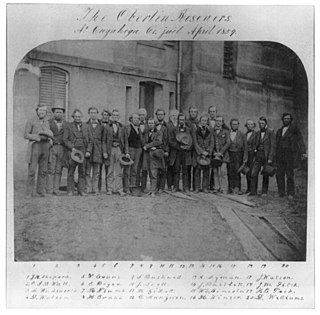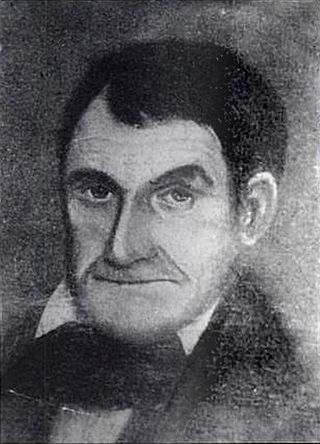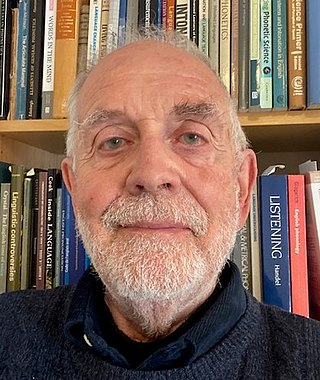
Khmer is an Austroasiatic language spoken by the Khmer people, and the official and national language of Cambodia. Khmer has been influenced considerably by Sanskrit and Pali, especially in the royal and religious registers, through Hinduism and Buddhism. It is also the earliest recorded and earliest written language of the Mon–Khmer family, predating Mon and Vietnamese, due to Old Khmer being the language of the historical empires of Chenla, Angkor and, presumably, their earlier predecessor state, Funan.
In linguistics, creaky voice refers to a low, scratchy sound that occupies the vocal range below the common vocal register. It is a special kind of phonation in which the arytenoid cartilages in the larynx are drawn together; as a result, the vocal folds are compressed rather tightly, becoming relatively slack and compact. They normally vibrate irregularly at 20–50 pulses per second, about two octaves below the frequency of modal voicing, and the airflow through the glottis is very slow. Although creaky voice may occur with very low pitch, as at the end of a long intonation unit, it can also occur with a higher pitch. All contribute to make a speaker's voice sound creaky or raspy.

Oberlin College is a private liberal arts college and conservatory of music in Oberlin, Ohio. It is the oldest coeducational liberal arts college in the United States and the second oldest continuously operating coeducational institute of higher learning in the world. The Oberlin Conservatory of Music is the oldest continuously operating conservatory in the United States. In 1835, Oberlin became one of the first colleges in the United States to admit African Americans, and in 1837 the first to admit women. It has been known since its founding for progressive student activism.
Phonotactics is a branch of phonology that deals with restrictions in a language on the permissible combinations of phonemes. Phonotactics defines permissible syllable structure, consonant clusters and vowel sequences by means of phonotactic constraints.

Lane Seminary, sometimes called Cincinnati Lane Seminary, and later renamed Lane Theological Seminary, was a Presbyterian theological college that operated from 1829 to 1932 in Walnut Hills, Ohio, today a neighborhood in Cincinnati. Its campus was bounded by today's Gilbert, Yale, Park, and Chapel Streets.

On October 14, 1912, former saloonkeeper John Flammang Schrank (1876–1943) attempted to assassinate former U.S. President Theodore Roosevelt while he was campaigning for the presidency in Milwaukee, Wisconsin. Schrank's bullet lodged in Roosevelt's chest after penetrating Roosevelt's steel eyeglass case and passing through a thick single-folded copy of the speech titled "Progressive Cause Greater Than Any Individual", which he was carrying in his jacket. Schrank was immediately disarmed and captured; he might have been lynched had Roosevelt not shouted for Schrank to remain unharmed. Roosevelt assured the crowd he was all right, then ordered police to take charge of Schrank and to make sure no violence was done to him. Roosevelt did not believe in police harming civilians.
In linguistics, prosody is concerned with elements of speech that are not individual phonetic segments but are properties of syllables and larger units of speech, including linguistic functions such as intonation, stress, and rhythm. Such elements are known as suprasegmentals.
Dr. Vernon Johns was an American minister based in the South and a pioneer in the civil rights movement. He is best known as the pastor (1947–52) of the Dexter Avenue Baptist Church in Montgomery, Alabama. He was succeeded there by Dr. Martin Luther King Jr.

The Oberlin–Wellington Rescue of 1858 in was a key event in the history of abolitionism in the United States. A cause celèbre and widely publicized, thanks in part to the new telegraph, it is one of the series of events leading up to Civil War.
The Roud Folk Song Index is a database of around 250,000 references to nearly 25,000 songs collected from oral tradition in the English language from all over the world. It is compiled by Steve Roud, a former librarian in the London Borough of Croydon. Roud's Index is a combination of the Broadside Index and a "field-recording index" compiled by Roud. It subsumes all the previous printed sources known to Francis James Child and includes recordings from 1900 to 1975. Until early 2006, the index was available by a CD subscription; now it can be found online on the Vaughan Williams Memorial Library website, maintained by the English Folk Dance and Song Society (EFDSS). A partial list is also available at List of folk songs by Roud number.

John Millott Ellis was a 19th-century abolitionist minister and intellectual who served as acting President of Oberlin College in 1871. He was a professor of philosophy at Oberlin from 1866 to 1896.
Stephen Frederick Starr is an American expert on Russian and Eurasian affairs, a musician, and a former president of Oberlin College.
Gary Lee Nelson is a composer and media artist who taught at Oberlin College in the TIMARA department. He specializes in algorithmic composition, real-time interactive sound and video along with digital film making.

J. F. Oberlin University is a private university in Machida, Tokyo, Japan. The university was founded by Yasuzo Shimizu. Its name is derived from that of pastor and philanthropist J. F. Oberlin, and the name also shows the university's historical ties with Oberlin College in Oberlin, Ohio, which the university's founder attended.

Owen Brown, father of abolitionist John Brown, was a wealthy cattle breeder and land speculator who operated a successful tannery in Hudson, Ohio. He was also a stout and outspoken abolitionist and civil servant. Brown was a founder of multiple institutions including the Western Reserve Anti-Slavery Society, Western Reserve College, and the Free Congressional Church. Brown gave speeches advocating the immediate abolition of slavery and facilitated the Underground Railroad.
Gelineau psalmody is a method of singing the Psalms that was developed in France by Catholic Jesuit priest Joseph Gelineau around 1953, with English translations appearing some ten years later. Its chief distinctives are:
William Edwards Stevenson was an American track and field athlete, lawyer and diplomat, who won the gold medal in the 4 × 400 metres relay at the 1924 Summer Olympics, and later served as the president of Oberlin College.
Oberlin Shansi Memorial Association, situated on the campus of Oberlin College in Oberlin, Ohio, is an independent non-profit organization whose goal is "to promote understanding and communication between Asians and Americans. This is accomplished through individual and group educational and social programs, educational and cultural exchanges, and community projects." Founded in January 1908, the original purpose was to memorialize the members of the Oberlin Band who were killed in Shansi province, China, during the Boxer Uprising in 1900. Beginning in 1918, the Oberlin student body elected graduating students as Representatives to teach English and support extracurricular activities at the Ming Hsien School in Taigu, Shansi. This tradition was interrupted at the time of the Korean War in 1951 but resumed in 1980. Today the Association, in association with Oberlin College maintains partner sites in Japan, Indonesia, India, and China, as well as hosting scholars and artists from the partner countries to the Oberlin College campus.

Peter John Roach is a British retired phonetician. He taught at the Universities of Leeds and Reading, and is best known for his work on the pronunciation of British English.
James Bradley was an African slave in the United States who purchased his freedom and became an anti-slavery activist in Ohio.








